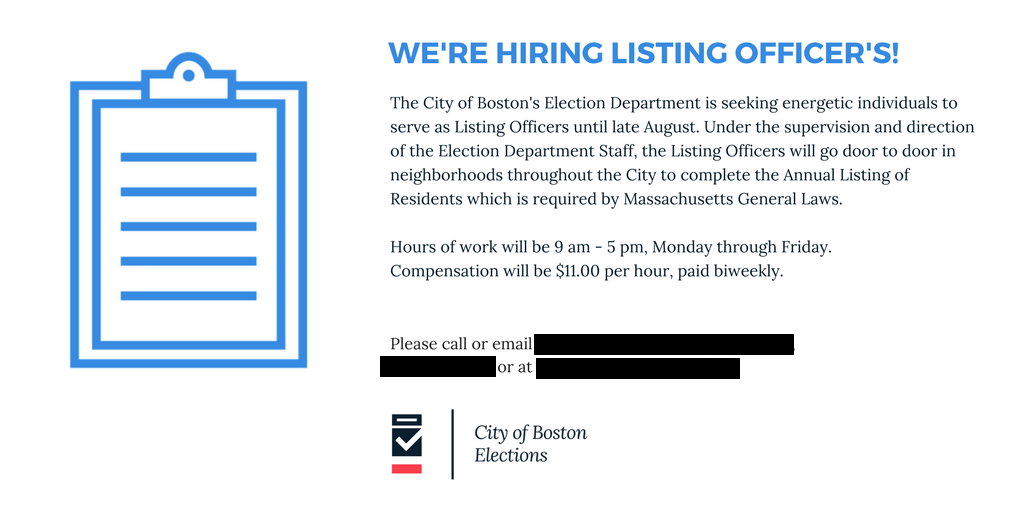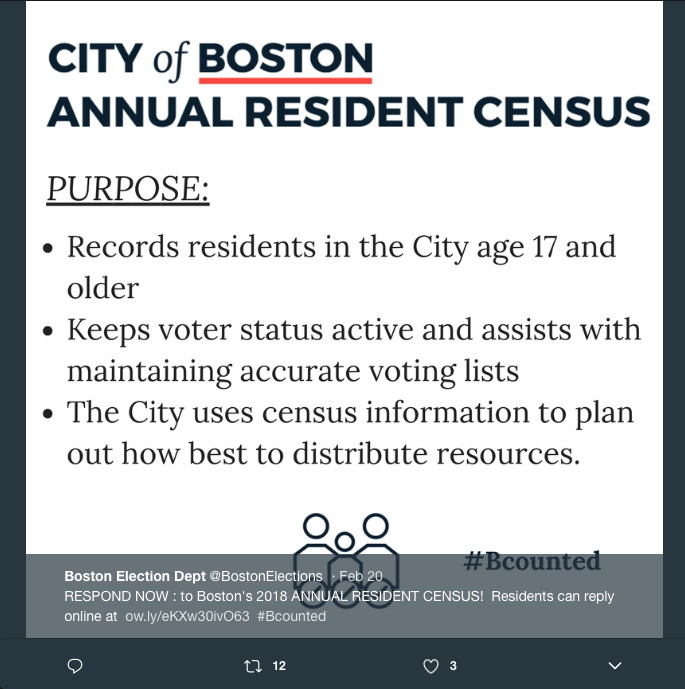
The annual collection of self-reported Massachusetts resident data is an invasive, costly, and exploited dataset that should be discontinued.
Every year, all 351 cities and towns in Massachusetts mail out questionnaires that require residents to disclose personal information including legal name, home address, date of birth, nationality and occupation. Massachusetts General Laws Chapter 51 authorizes municipalities to collect and publish this information annually. The law dates back to at least 1923.
Today, the law has little to do with voters and has been re-purposed to generate a master list of potential jurors as well as a list of dog owners to help enforce compliance with dog licenses. These reasons do not justify the significant costs and hazardous exposure of personally identifiable information of every Massachusetts resident.

Lists
Personal information returned on the questionnaire is compiled into two types of lists: street lists and numbered resident lists.
Street lists for a given town with everyone's name, home address and age or year of birth are readily available from town clerks. There is usually a small fee of $10 to $15 like in Auburn, Avon or Milton. Other towns like Grafton, Marshfield and Leicester simply publish the street lists online.
Unfortunately, these same data elements are widely used by banks, schools, and governments to help verify identity.
Massachusetts law has unintentionally created a wish list for identity thieves who may destroy a person's credit or a list for data brokers to collect and sell personal information. The listings could also be used to identify the names and birthdays of people in the same household. In fact, the lists could be used by co-workers, patients, customers, clients or really anyone.
As public record, residents have no recourse, no way to remove their personal information other than to not respond. However, responding to the questionnaire is compulsory and neglecting this responsibility may result in fines or imprisonment.
Residents of apartment complexes have no choice because their name and date of birth must be provided by the complex owner. This means that data about a resident is entered into the public record without their knowledge, consent or verification.
In short, it is a dangerous exposure of personal information.
Inactive voters
A required warning on the questionnaire notifies residents that failure to respond will result in removal from the "active" voter list. However, this is misleading because "inactive" voters can still vote.
The inactive vs active terminology appears to have been introduced around 1993 as a way to maintain voter registration. Voters who do not respond and who also do not vote are considered inactive and eventually removed from the inactive list and presumably the voter rolls.
There is no compelling reason that the annual questionnaire is required to generate an inactive voter list since a similar list could be generated from registered voters that simply do not vote.
The gold standard of juror lists
Massachusetts is the only state that uses an annual self-reporting questionnaire to generate juror lists.
The state claims to "have the best, most complete, and most representative Master Juror List in the nation" and boasts of a process “widely regarded as the ‘gold standard.’” There is no evidence to support these claims.
In fact, there is ample evidence to suggest that the Massachusetts system is deeply flawed with serious questions of representation.
The case of United States vs Green in 2005 demonstrated that African-Americans are "persistently underrepresented..." in Massachusetts juror pools due to under-counting, non-respondents and undeliverable addresses.
Juror selection lists based on self-reporting forms are only useful and fair if every resident completes the form accurately and returns it to their respective municipality.
The town of Wilbraham reported that at least 20% of census forms were not returned. During calendar year 2014, the Massachusetts Office of State Auditor found that over one-third of all summons to potential jurors fell into categories including "summons returned as undeliverable" and "no response from summons." The self-reporting nature of the annual resident listing also led to the jury summons for a cat that had been listed by the family as a resident.
Not surprisingly, no other state uses this so-called "gold standard." A majority of the other 49 states create jury selection source lists from routinely updated databases such as voter registration lists, licensed driver lists or some combination.
These approaches are likely more cost-effective and accurate than building redundant and massive new datasets every year from scratch based on self-reporting questionnaires.
Unfunded mandate
The state questionnaire is an unfunded mandate with significant costs to local taxpayers. These costs are related to the questionnaire's planning, mailing, processing, data entry, and compliance with state regulations.
The system favors more affluent communities because those with fewer resources need to choose how to best allocate funds or personnel to the street list effort. This is at least part of the problem with juror representation since towns that generate less tax revenue have a more difficult time maintaining accurate lists.
Town clerks in Southborough and Plymouth have both expressed concern about the expense to taxpayers. For years, the West Bridgewater town clerk has enlisted the help of local police to enforce compliance with non-responding households even though the local Police Chief agrees "it's a waste of resources."
New Bedford apparently didn't have the resources to update their list for years. Massachusetts now brags on its official website about threatening to sue the city to enforce compliance.
The City of Boston's effort is particularly expensive because of taxpayer funded "listing officers" that are hired to go door-to-door in an effort to identify non-responding residents.


The Boston Annual Resident Listing forms also state that collection of the personal information "is necessary... to provide better municipal services."
Separately, the street lists that currently exist already include non-US citizens. This could be a problem for sanctuary cities across the Commonwealth like Boston, Cambridge, Somerville, and Springfield. The federal government could simply cross-check the street lists that include nationality against federal lists to identify undocumented immigrants.
The occupation question
The question of occupation, introduced in 1923, has no clear purpose today. It is no longer the case that certain occupations exempt one from jury duty although this was true a long time ago.
Under current Massachusetts state law, "No person shall be exempt or excluded from serving as a grand or trial juror because of... occupation." The Massachusetts Office of Jury Commissioner continues to require occupation be included as a data element in the Numbered Resident Files even though it has nothing to do with jury selection today.
Like the citizenship question, the additional transcription of occupational data likely adds significant time and cost to this unfunded mandate.
Originally posted: February 8, 2018
Last updated: April 15, 2018
info [at] baystatebreakdown [dot] com